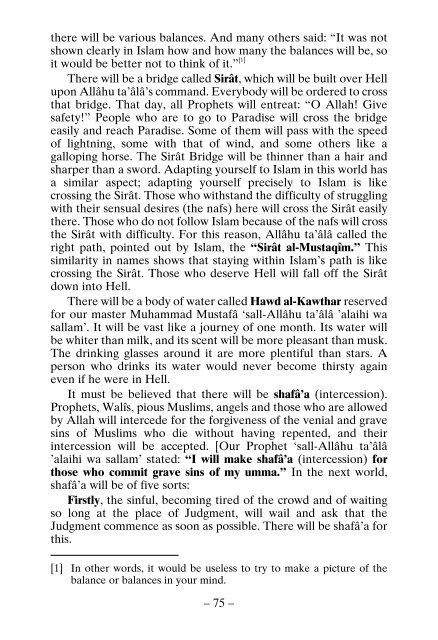Belief and Islam
BELIEF AND ISLAM star This work, Belief and Islam, originally was written in Persian under the title I’tiqâd-nâma by Hadrât Mawlânâ Khâlid al-Baghdâdî, a profound ‘âlim of Islam and a specialist in ma’ârif of tasawwuf. Hâji Faydullah Effendi of Kemah, a khalîfa of great walî Mavlânâ Mahmûd Sâhib, the brother of the author, translated the book into Turkish and named it Farâid-ul-fawâid which was printed in Istanbul in 1312 A.H.[1894]. Our bookstore had it translated again from the Persian original into Turkish and, some explanations and three chapters, published it with the title Imân ve Islâm in 1966. German, French and Arabic versions are also published by our bookstore. This book, explains five fundamentals of Islam, six fundamentals of îmân and the contemporary information about the matter and refutes those who are against Islam and those who are lâ-madbhabî.
BELIEF AND ISLAM
star This work, Belief and Islam, originally was written in Persian under the title I’tiqâd-nâma by Hadrât Mawlânâ Khâlid al-Baghdâdî, a profound ‘âlim of Islam and a specialist in ma’ârif of tasawwuf. Hâji Faydullah Effendi of Kemah, a khalîfa of great walî Mavlânâ Mahmûd Sâhib, the brother of the author, translated the book into Turkish and named it Farâid-ul-fawâid which was printed in Istanbul in 1312 A.H.[1894]. Our bookstore had it translated again from the Persian original into Turkish and, some explanations and three chapters, published it with the title Imân ve Islâm in 1966. German, French and Arabic versions are also published by our bookstore. This book, explains five fundamentals of Islam, six fundamentals of îmân and the contemporary information about the matter and refutes those who are against Islam and those who are lâ-madbhabî.
You also want an ePaper? Increase the reach of your titles
YUMPU automatically turns print PDFs into web optimized ePapers that Google loves.
there will be various balances. And many others said: “It was not<br />
shown clearly in <strong>Islam</strong> how <strong>and</strong> how many the balances will be, so<br />
it would be better not to think of it.” [1]<br />
There will be a bridge called Sirât, which will be built over Hell<br />
upon Allâhu ta’âlâ’s comm<strong>and</strong>. Everybody will be ordered to cross<br />
that bridge. That day, all Prophets will entreat: “O Allah! Give<br />
safety!” People who are to go to Paradise will cross the bridge<br />
easily <strong>and</strong> reach Paradise. Some of them will pass with the speed<br />
of lightning, some with that of wind, <strong>and</strong> some others like a<br />
galloping horse. The Sirât Bridge will be thinner than a hair <strong>and</strong><br />
sharper than a sword. Adapting yourself to <strong>Islam</strong> in this world has<br />
a similar aspect; adapting yourself precisely to <strong>Islam</strong> is like<br />
crossing the Sirât. Those who withst<strong>and</strong> the difficulty of struggling<br />
with their sensual desires (the nafs) here will cross the Sirât easily<br />
there. Those who do not follow <strong>Islam</strong> because of the nafs will cross<br />
the Sirât with difficulty. For this reason, Allâhu ta’âlâ called the<br />
right path, pointed out by <strong>Islam</strong>, the “Sirât al-Mustaqîm.” This<br />
similarity in names shows that staying within <strong>Islam</strong>’s path is like<br />
crossing the Sirât. Those who deserve Hell will fall off the Sirât<br />
down into Hell.<br />
There will be a body of water called Hawd al-Kawthar reserved<br />
for our master Muhammad Mustafâ ‘sall-Allâhu ta’âlâ ’alaihi wa<br />
sallam’. It will be vast like a journey of one month. Its water will<br />
be whiter than milk, <strong>and</strong> its scent will be more pleasant than musk.<br />
The drinking glasses around it are more plentiful than stars. A<br />
person who drinks its water would never become thirsty again<br />
even if he were in Hell.<br />
It must be believed that there will be shafâ’a (intercession).<br />
Prophets, Walîs, pious Muslims, angels <strong>and</strong> those who are allowed<br />
by Allah will intercede for the forgiveness of the venial <strong>and</strong> grave<br />
sins of Muslims who die without having repented, <strong>and</strong> their<br />
intercession will be accepted. [Our Prophet ‘sall-Allâhu ta’âlâ<br />
’alaihi wa sallam’ stated: “I will make shafâ’a (intercession) for<br />
those who commit grave sins of my umma.” In the next world,<br />
shafâ’a will be of five sorts:<br />
Firstly, the sinful, becoming tired of the crowd <strong>and</strong> of waiting<br />
so long at the place of Judgment, will wail <strong>and</strong> ask that the<br />
Judgment commence as soon as possible. There will be shafâ’a for<br />
this.<br />
[1] In other words, it would be useless to try to make a picture of the<br />
balance or balances in your mind.<br />
– 75 –

















